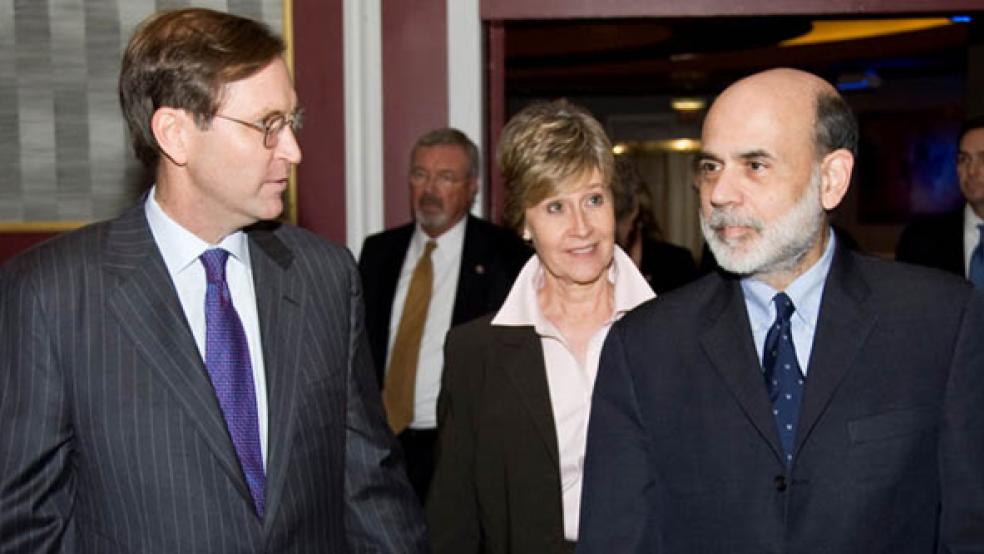The tax bill that President Obama signed to great fanfare last month shows neither presidential leadership nor a turn away from no-holds-barred gridlock. Quite to the contrary, Obama merely signed the bill the G.O.P. handed him, and relations between the White House and Republicans in the Congress that convenes this week will remain bitterly divided ahead of the 2012 election. So, don’t expect major tax or entitlement reform or deficit reduction.
Those are the views of leading Republican economist Glenn Hubbard, dean of the Columbia Business School and chairman of the Council of Economic Advisers from 2001 to 2003 under President George W. Bush. As Bush's top economist, Hubbard pushed for the sweeping income tax cuts that Obama and Congress just extended. Here he answers critics who say that letting the tax cuts expire when the extension ends in two years would be an effective alternative to the deep spending cuts that the chairmen of the president's deficit-reduction panel have proposed.
Never a stranger to controversy, Hubbard rejects the view that taxes should never be raised, arguing that scaling back the home-mortgage interest deduction and other popular tax breaks can help reduce the federal deficit. In this provocative interview, he also responds to his unflattering portrayal in the recently released film Inside Job, which accuses him and other economists of enabling the financial crisis by cozying up to the corporate world.
The Fiscal Times (TFT): We just saw an example of White House and Congressional
bipartisanship in extending the Bush tax cuts. What chance do you see for bipartisanship on budget issues in the new Congress?
Glenn Hubbard (GH): I think there is almost no chance, in the sense that the two sides are way too ideologically apart. The president's views on the budget are that the country's problems can be fixed by raising [marginal] taxes on high-income people, and that's false. You could confiscate the wealth of upper-income people and not fix the problem. The Republicans are in no mood to compromise on entitlement programs, which is what the president wants.
on anything on economic policy.”
Now presidential leadership can help. If you look at the tax reform act of 1986, I think that [President Reagan] led that along with the Democrat Dan Rostenkowski, who was chairman of the House Ways and Means Committee. But I have not seen this president lead on anything on economic policy.
TFT: What about extending the Bush tax cuts?
GH: He didn't lead it. He took a bill from the Republicans and knew he had to sign it. You could call that leadership, I guess. Getting out in front of a parade.
TFT: How would you critique the substance of the tax-cut agreement?
GH: I would have extended the entire Internal Revenue Code, which is more or less what happened, until we're ready to have a serious conversation about two subjects. One is the size of government and the second is the right tax system to pay for it. My guess is that's going to happen in the 2012 election and in 2013.
If you look at the tax bill as a piece of tax policy, clearly much better could have been done. But I think that's too high a hurdle.
TFT: What could have been done better?
GH: A much better thing would be to talk about real tax reform. To talk about a shift toward more consumption-style taxation, and to really ask what tax burdens we want in this country.
will have to be on the spending side … [but] I don't think
you can say there will be no tax increases.”
TFT: You have written that it's unrealistic to argue that no tax should ever be raised to help lower the deficit. What taxes would you like to see raised?
GH: I think the overwhelming majority of the fiscal changes will have to be on the spending side. I say that not out of politics but out of arithmetic. If you look at the size of the imbalances, they're so large that you couldn't really raise taxes enough to do it.
By the same token, I don't think you can say there will be no tax increases. As an economist, I would say let's not raise marginal rates that would affect work or saving or entrepreneurship, which is what the president wanted to do. That doesn't mean we can't raise average rates. The things I would have in mind would be scaling back deductions that would take away average tax subsidies that we're giving to high-income people: the home-mortgage interest deduction, charitable donations, state and local deductions.
TFT: How would you define high income?
GH: Each proposal is different. The work that Bob Pozen [chairman of MFS Investment Management and senior lecturer at the Harvard Business School] had done some years ago suggests that by doing [benefit] adjustments for upper middle-income households, say $100,000 a year or more, we could actuarily fix Social Security.
TFT: As chairman of the Council of Economic Advisers under George W. Bush, you called for the tax cuts that have now been extended for two more years. How do you respond to those who argue that letting all the tax cuts expire in two years would do as much or more to lower the deficit as all the recommendations — including scaling back the home-mortgage and other deductions — of the deficit-cutting panel that Chester Bowles and Alan Simpson chaired?
GH: That's just not true. For any given time horizon, Bowles-Simpson is bigger than Bush — 10 years, 15 years, forever. The present value for Bowles-Simpson is just a much bigger number. It is true that not extending the Bush tax cuts would have a large effect on the deficit. But it would be a very poor way of doing that compared with cutting government spending.
Keep in mind that it would amount to a very large middle-class tax increase. The bulk of the Bush tax cuts are not at the top, which tells you that most of the tax increase would be borne by middle-class Americans. I'm not sure that there's a politician who would like to advocate that policy. I haven't met any if they are out there.
… We're a pretty dumb cabal if we're a cabal.”
TFT: You were interviewed in the film “Inside Job,” a documentary about the financial crisis that nearly wrecked the economy. The film attacked economists like yourself for advising Wall Street firms and serving on corporate boards, and this contributed to the crisis in the filmmaker's view. How would you respond to this argument?
GH: The movie's fundamental premise is flawed. The notion that a handful of experts or government officials brought down the financial system — I mean, I could only wish that I had the power to bring down the financial system. My life is much more modest than that. Economists, business people, financial types, everyone made mistakes, certainly, going into the financial crisis. But this idea of a cabal seems strange, especially given the fact that almost everyone in the movie, including myself, lost large amounts of money during the crisis. We're a pretty dumb cabal if we're a cabal.
I'm very proud of my service on corporate boards and it's certainly not a secret since it's disclosed on SEC filings, so I'm surprised the maker of the movie makes it sounds so secret. I actually think economists have an important role to play in the sense that for many firms knowledge of the overall economy is an important part of what a board must do.
TFT: The film also attacked the relationship between Wall Street and Washington as being too close. What is your view of this?
GH: That is a very deep and interesting question. On the one hand, you want to have financial market expertise at the top of government for the same reason you want experts talking to companies. On the other hand, you don't want that to be cozy. It should be the case that government officials are willing to stare down financial institutions.
As an economist, I felt that during the past crisis both the Republican administration and the Democratic administration that followed it were not as questioning of Wall Street as they should have been. I don't think that's because there was some kind of cabal, but I do think that there is a bit of familiarity there.
TFT: What key lessons can be learned from the crisis?
GH: I think there are many. One is watch the leverage. Regulators did not pick it up and I think that is a really big issue. The second is transparency — making sure that we know what's embedded in these [derivative] securities, and we did not. And the third is to get the incentives right. At 2,300 pages, I would call [the Dodd-Frank financial reform act] too big to read.
in the country and didn't even look at
the things that caused the [financial] crisis.”
TFT: How would you assess the financial reform measure?
GH: I think there is a lot of good in Dodd-Frank. I think focusing on consumer protection is a very good idea. Exchange-trading of derivatives is good. It's not that Dodd-Frank is a waste of time and energy. But I do think the really big issues were not covered. It didn't do anything really about too big to fail, and it didn't do anything about the very vortex of the crisis, which was Fannie Mae and Freddie Mac. So we just went through this wrenching debate in the country and didn't even look at the things that caused the crisis.
TFT: Looking ahead to the U.S. economy in 2011, how do you view the outlook for growth and employment?
GH: I think we're likely to see GDP growth right around or maybe even higher than the economy's long-run potential, which is around 3 percent. The unemployment rate a year from now, however, will not be much lower than it is now. We have to grow faster than that to bring down unemployment.
Normally in a recovery from a recession we have first-year output growth of about 6 percent. We didn't see that this time. You have to create about 150,000 jobs a month just to stay even. So going toward that 2012 presidential election you're likely to have an economy that's growing modestly, but still very high joblessness.





